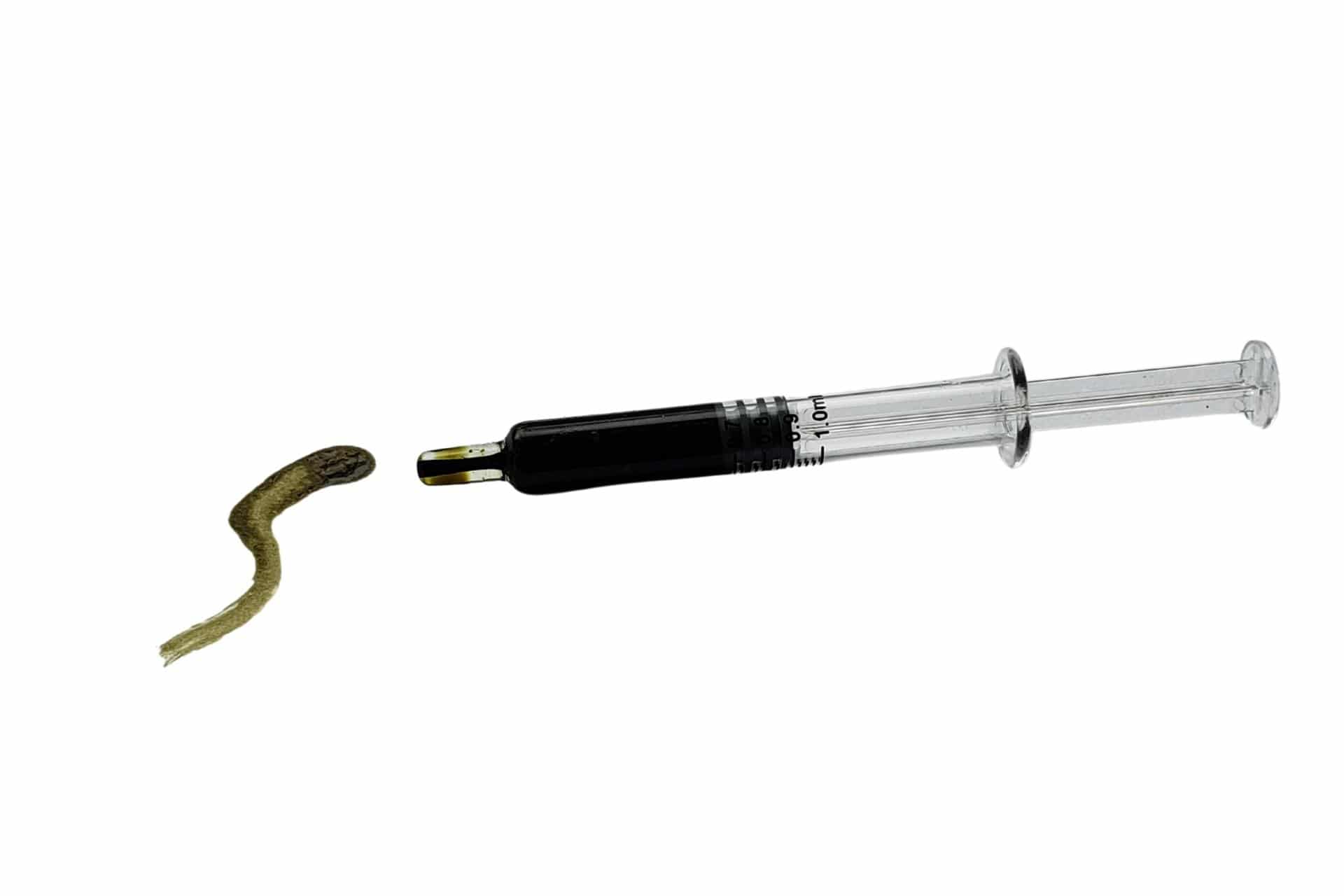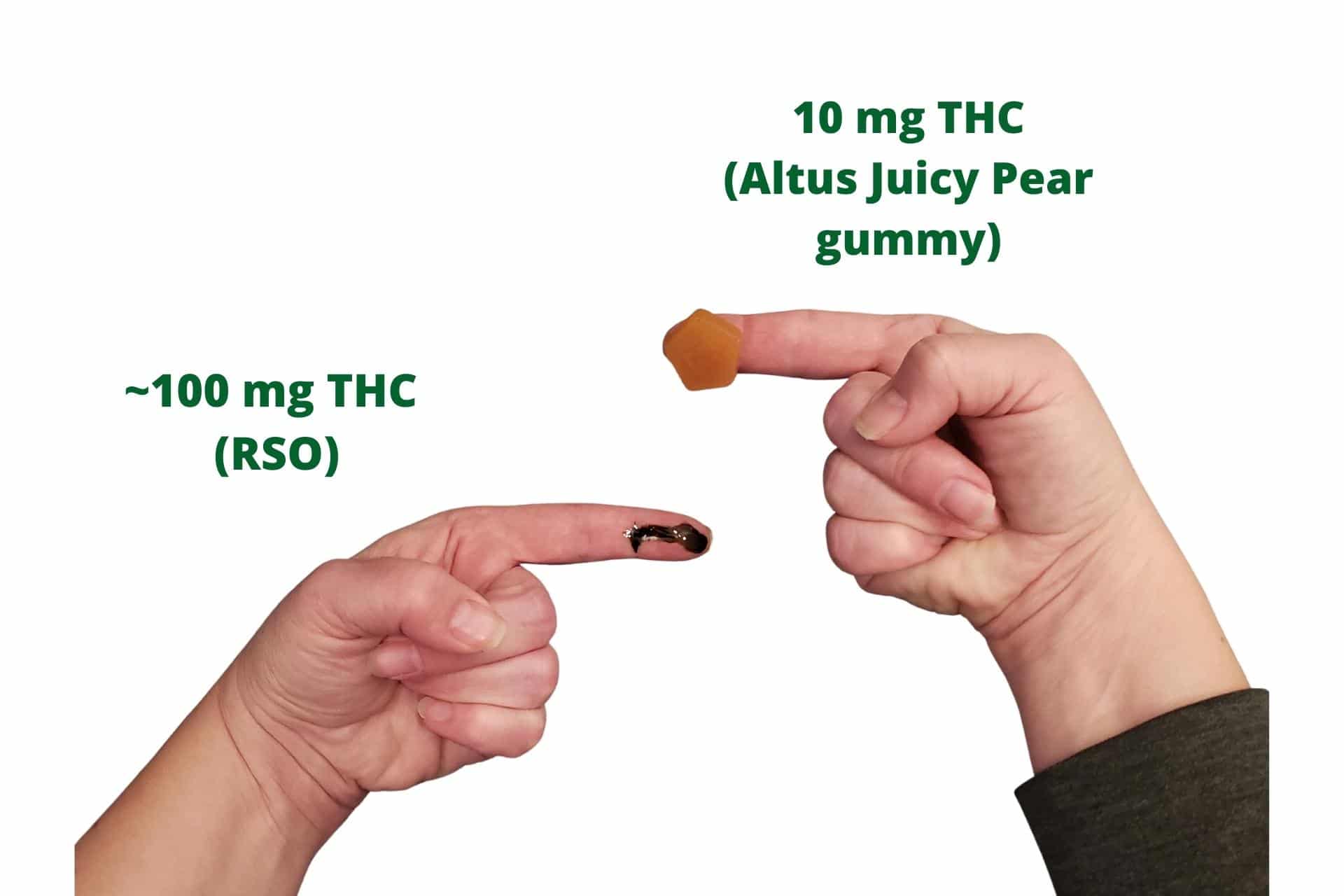If you’ve been researching cannabis for health, you’ve likely come across the term “RSO” but may wonder what exactly this less-common cannabis product is, and whether you should try it
Medically reviewed by Katherine Golden, RN, and Eloise Theisen, NP
Written by Denise Rustning
RSO, also known as Rick Simpson Oil, Phoenix Tears, full extract cannabis oil (FECO) or full spectrum oil (FSO) has gotten a lot of hype for its potential to treat cancer or other significant health issues. We sometimes get questions about RSO on the hotline, and our nurses are up-to-date on the research on RSO.
While RSO has its place in the world of cannabis therapeutics, it’s not a magic bullet and may not be the best option for your particular health concern. Today we’re going to provide some background information on RSO to help you assess whether it’s worth your time and money to seek out this potent cannabis extract.
What is RSO?
RSO is named after Rick Simpson, a Canadian medical marijuana activist who popularized the process for creating fully-extracted cannabis oil (FECO), using pure light aliphatic naphtha or 99% isopropyl alcohol as solvents to extract all of the plant’s cannabinoids, terpenes and other phytochemicals. At the time, Simpson used only high-THC strains, resulting in an extract with a high concentration of THC when compared to other cannabis products.
In other words, RSO is a product type, just like edibles or flower–it is not a brand or a specific strain.
When Rick Simpson first started making RSO, he also created treatment protocols for using RSO topically or orally. However, it’s important to note that Simpson was not a doctor and he was basing his protocol on the known science at the time in the early 2000s.
A lot has changed since then, and our Leaf nurses are up to date on the latest research around RSO. We encourage you to book a consultation with us before adding this high-potency product to your wellness regimen.

What RSO looks like
When you see an RSO product, the first thing that will stand out is its appearance which can be as a thick dark greenish-brown oil to a product that looks like honey, often packaged in syringes or capsules. Don’t get confused by the syringe! The syringe allows the thick liquid to push out slowly, though it can still be tricky to handle and precisely dose due to the thick, sticky nature of the oil.
RSO has been suggested online and by manufacturers to be used on the skin, taken by mouth, or mixed into edibles. Leaf411 nurses do not ever suggest applying a topical product to an open wound unless suggested by a wound care specialist and/or dermatologist. RSO should not be smoked or vaped.
How strong is RSO?
You’ll find different brands offering RSO, though RSO is not as popular as edibles, flower or other types of concentrates.
RSO products containing high THC concentrations can be found at some legal dispensaries. Each RSO syringe may contain 600mg or more of THC, but you’ll want to check the specific product label for cannabinoid test results since amounts may vary.
Depending on the concentration, each militer (ml) in the syringe may provide 100mg or more of THC. For comparison, many of our Leaf411 members’ cannabis edibles contain only 10mg THC per piece, which is 1/10th the amount you’ll likely find in a single ml of RSO.

Variations in today’s RSO products on the market
Since Rick Simpson first created his legendary extract, manufacturers have improved extraction processes. Also, product testing on the legal market provides more transparency around the amount of THC contained and other cannabinoids within each RSO syringe.
However, as the term “RSO” has become more popular, some brands have begun using the term more loosely for concentrates that are very different from what Simpson originally created.
Some manufacturers are now creating RSO ratio blends which feature THC plus significant amounts of CBD, CBG or other cannabinoids. Keep in mind that these high-powered options are different from the original RSO and may have very different effects. This doesn’t mean they are the wrong product for you, it just means to be aware of the ingredients in every product you purchase.
Also, the cannabis cultivar (strain) matters when it comes to RSO’s effects, since the extract’s power rests in a unique and potent combination of full-plant compounds. However, most manufacturers don’t provide this level of detail on their packaging or test results. Even the same brand’s RSO product can change over time due to variations between different plant harvests.
All this is to say that RSO can be a tricky product to buy, especially if consistency, accurate dosing, and potency are your top priorities.
Here are some examples of RSO/FECO products on the market today:
- Takoma Wellness RSO products (Washington, DC, medical dispensary)
- Herbiculture RSO products (Burtonsville, MD, medical dispensary)
- Peake Releaf RSO products (Rockville, MD, medical dispensary)
- A Therapeutic Alternative RSO products (Sacramento, CA, dispensary)
- Myriam’s Hemp Enhanced CBD FECO (Online hemp CBD retailer)
RSO is not a magic cure
RSO has gained a reputation for its powerful healing abilities, but unfortunately there is no evidence-based research on what types of conditions that RSO might help most with. In some cases, it may even do harm if someone delays research-backed treatment options while experimenting with RSO. Some research also suggests that RSO could contribute to more aggressive growth with certain cancers. To learn more about the challenges from an oncologist who has used cannabis as part of their patients’ treatment regimen, click this link.

How do you use RSO?
The cannabinoids in RSO have already been activated, so there’s no need to heat up the oil before using it. RSO can be added to food and beverages or used to make edibles, but remember that a very small amount goes a long way–RSO is very potent!
RSO can also be used topically on the skin, but only with the guidance of your clinical team that is providing care for your skin condition.
At Leaf411, we do not recommend RSO in a new, inexperienced user because of the potency and challenges with accurate dosing, especially with a concentrate as potent as RSO. Even increasing your dose by a little bit can make a big difference in the types of effects you feel. RSO’s high potency can lead to increased side effects like dry mouth, rapid heart rate, anxiety, paranoia and even hallucinations.
RSO is not designed for injecting–don’t be fooled by the syringe! We also recommend against vaping or smoking RSO due to the solvents used in its production, which can be damaging to lungs if vaped and explosive at high temperatures.
Store your RSO at room temperature away from light, and make sure it is secure and out of reach of pets and children.
Questions about RSO? Our cannabis-trained nurses can help!
Chances are that if you’re looking at RSO options, you are facing a serious health concern. The last thing you want to do is make things worse or complicate your treatment options.
While your primary care doctor and specialist team may not fully understand cannabis therapeutics, our Leaf nurses do. Our fully-licensed cannabis-trained RNs can help point you in the right direction when it comes to understanding the research and finding the right questions to bring to your medical treatment team. We don’t replace specialists like oncologists, but we are able to look at the evidence and provide general information on different cannabis options, including RSO. We can also connect you with cannabis-trained clinicians who can review your records and make specific recommendations based on your case.
Click this link for our online scheduling service and find a day and time for your Leaf nurse consultation call.
The Leaf411 cannabis nurse hotline provides education and directional support to the general public about the safe use of legal cannabis. We partner with select business members who meet our rigorous standards to extend our education and outreach efforts.

